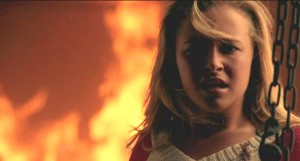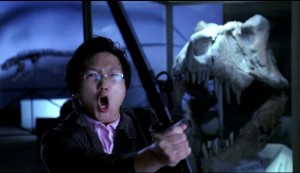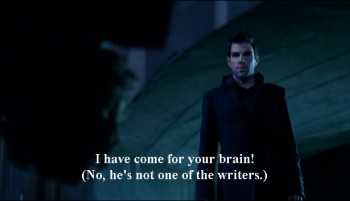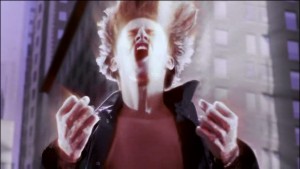|
I don't get it. Maybe it's just me, but I don't get it. Following in the recent trend of television shows with season-long plot arcs and fantastical happenings, what we have here is a story about the spontaneous appearance of people with varying superpowers that begin popping up across the globe-or, well, mostly across the United States, who start discovering their abilities and pondering what should be done with these newfound and sometimes unwanted powers. These X-Men-er, I mean heroes, gradually cross paths in a million different ways in a stunning lattice of coincidence, while a mysterious organization pursues them for purposes that are likely not slanted towards the good end of things. 
Everyone seems to like this show, including many with whom I share a modicum of tastes, and I don't really understand why. It's not the basic premise; that's just fine. It's rather obviously rehashing The X-Men, including many of the superpowers (self-healing, ice, fire, shape-shifting, theft of other's abilities, etc.), but I never read or cared about the X-Men, so that's not such an issue (though it does end up stealing from other works I do happen to like a great deal, which is another matter entirely). It's largely in the way that the story is told that consistently gets beneath my skin and squirms around like agitated sandpaper. We have a veritable pantheon of characters here, and most of them I can feel little or nothing about. Nearly all of them come across as emotionally walled off and distant, and even when someone dies or nearly does so, my reaction leans towards the "oh" end of the spectrum. What's wrong? Clearly this isn't true for most viewers, so why so with me? Partly, at least, it's the attitude. One might expect a series full of superheroes to be fun, or at least occasionally lighthearted. Anything approaching humor can go handfuls of episodes in between, with only the character of Hiro Nakamura, time-traveling office clerk, to offer any sense of whimsy. The rest of the events play out in an increasingly ponderous isn't-this-just-deeply-serious tone, and I might agree that yes, things are indeed serious, if it wasn't for the fact that I have to made to care first. 
One would think, or hope, that in this day and age there would be a sort of screenwriter's handbook, a helpful guide to what one should, under no circumstances, ever write into a script, a general collection of clichés beaten into the ground by countless attempts to reduce the dead horse to a liquid form that can now be happily retired. By the year 2006, we should no longer have to endure such developments as: Someone walks into a murder scene and picks up a weapon just as the cops burst in. The good guys call the cops after finding a serial killer's lair, only for it to be empty when the police show because nobody bothered to watch the front door. One character finds she has, more or less, an evil twin. Say it with me: EVIL TWIN. When has that idea ever been worth a damn? There's other annoying bits, such as the wife who throws out the standard "it's either me or (fill in the blank)" ultimatum, the various individuals constantly running around saying insane-sounding things and acting pissed and confused when no one believes them, the steadily lessening surprise factor every time yet another character turns out "unexpectedly" to have some kind of power, and of course, the shitty science. As the show begins, Mohinder Suresh, world's worst geneticist, is expounding upon his irredeemably mangled views on human development, which he is carrying on from his 
I was disappointed, but was advised to stick with it, with reassurances that things would get better. This was true, after a fashion: episode seventeen I genuinely liked. Finally the character drama was working, the emotion seemed real, and nobody used the word "destiny" for the entire episode. Better late than never, I thought, until two episodes later, when I discovered that the underlying plot was shamelessly ripped off from Watchmen, one of the few comic books I deeply respect and which runs rings around this pale shadow. (There's also the really irritating fact that, whether or not the Watchmen movie currently in the works turns out to be any good, it will now be seen by many as a ripoff of Heroes, which pisses me off to no end.) After starting to get its feet, it falls apart again amidst a mess of vague motivations and clumsy continuity. Hiro ends up in the future and meets himself, who asks his past incarnation if he successfully changed some specific event. Did the writers not realize that the character's future self should just plain remember what his past self did or didn't do? Christopher Eccelston shows up as an invisible man with a bad attitude, and is real breath of fresh air until he just melts out of the story. He's first seen in the precognitive dream of the power-absorbing Peter Petrelli, laughing as Peter faces what might be his and New York's impending doom...too bad that never actually ended up happening. Peter's jut-jawed brother Nathan, a Senatorial prospect, spends most of the series denying anything's up despite the fact that he can fly, until he's finally told he must do something terrible as part of the grand plan, to which his reaction runs basically: "No! I'll never do that. Well...okay. It's inevitable anyway, and nobody can stop me! Haw haw! Ahh, wait...naah." No wonder it took a rigged election to get this wishy-washy flip-flopper elected. And honestly, do they really think that endlessly repeating a hokey line like "Save the cheerleader, save the world" magically gets less hokey if you just keep saying it a million times over? If I was Claire Bennet, the ostensible lead of this ensemble, I would get rather irked at continously being referred to as "the cheerleader" well after A. Everyone knows full well what my name is, and B. I'm not even a cheerleader anymore. 
I frequently enjoy writing a good hatchet piece when something really pisses me off, but my final evaluation of Heroes just kind of leaves me slightly depressed. I'd much rather have liked it. So many of the problems are just stylistic, which leaves me wondering just why the hell they had to be there at all; it's like having a Porsche decorated with pigeon shit. The shit doesn't make the engine run any better, so why have it? Why the dumb scenes and the clunky continuity? This could have been fun and intriguing, but the whole thing just left me cold. Claire makes a likeable enough heroine, and her father turns out to be a pretty good character by the time it's all over, but none of the others really connect. The sentimentality is too often obvious and cheap, the "secret" left behind for how to defeat the villain ends up pretty underwhelming as secrets go ("stab him"), and the unending ramblings about achieving one's destiny make me want to rip out my colon and fling it at someone (if destiny was real, you'd achieve it whether you wanted to or not; that's what destiny means). I'd like to think that perhaps the currently in-progress second season will improve over the first,* but since the weakest area is the execution rather than the plot, I've little hope, given the widespread positive reception the show has already received, that this will likely change at all. So much effort, so much time.... Pity. -review by Matt Murray *I'm given to understand, even from people who like this show, that season 2 went down the toilet, and season 3 was last seen drifting through the sewers and into the mouth of a giant mutated alligator. So much for best hopes. Even former Veronica Mars star Kristen Bell couldn't lure me back at this point.
|
|
||||||||